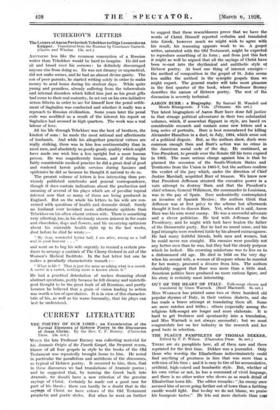• TCHEKHOV'S LETTERS
The Letters of Anton Pavlovitch Tchekhov to Olga Le ona rd ovna %nipper. Translated from the Russian by Constance Garnett. (Chatto and Windus. 15e. net.) ANYTHING less like the common conception of a Russian writer than Tchekhov would be hard to imagine. He did not sit and brood over his sorrows : he definitely discouraged anyone else from doing so. He was not dreamy or unpractical, did not make scenes, and he had an almost divine gaiety. The son of poor parents, he started writing solely in order to make money to send home during his student days. While quite young and penniless, already suffering from the tuberculosis and internal disorders which killed him just as his great gifts had come to their real maturity, he set out on his own initiative across Siberia in order to see for himself how the penal settle- ment of Saghalien was conducted and whether it really was a reproach to Russian civilization. Some years later the penal code was modified 'as a result of the interest his report on Saghalien had aroused in high quarters. .The work was a real labour of love.
All his life through Tchekhov was the best of brothers, the
kindest of sons :'-he made the most rational and affectionate of. husbands. And while his altogether practical virtues are really striking, there was in him less sentimentality than in most men, and absolutely no goody-goody quality which might have made one wish him a legs upright but a more human person. He was magnificently human, and if during his fairly considerable medical practice he did a great deal of good and rendered heroic public services during famines and epidemics he did so because he thought it natural to do so.
`The present volume of letters is less interesting than pre- viously published notebooks and general correspondence, though it - does contain indications about the production and meaning of several of his plays which are of peculiar topical interest now that so many of them are being produced. in England. But on the whole his letters to his wife are con- cerned with questions of health and domestic detail. Surely
no husband ever lavished more affectionate-' epithets than Tchekhov on his often absent actress wife. There is something very affecting, too, in his obviously sincere interest in fur coats and chocolates, dogs and flowers, and his unvarying optimism
about his miserable health right up to the last weeks, .Just before he died he wrote :—
- " My dear; wonderful better half, I am alive, strong as a bull and in good humour . . .
and went on to beg his wife urgently to remind a certain pro- ducer to arrange a matinee of The Cherry Orchard in aid of the Women's Medical 'Institute. In the last letter but one he makes a peculiarly characteristic remark-: " What is life ? That is just the same as asking what is a carrot.
A carrot is a carrot, nothing more is known about it."
He had a practical detestation of useless dreaming about abstract questions, partly because he felt dreamy and unintelli- gent thought to be the great fault of all Russians, and partly because he believed that a grain of vision leading to action was worth a ton of speculation. It is in view of this character- istic of his, as well as his warm humanity, that his plays can best be understood.






































































 Previous page
Previous page